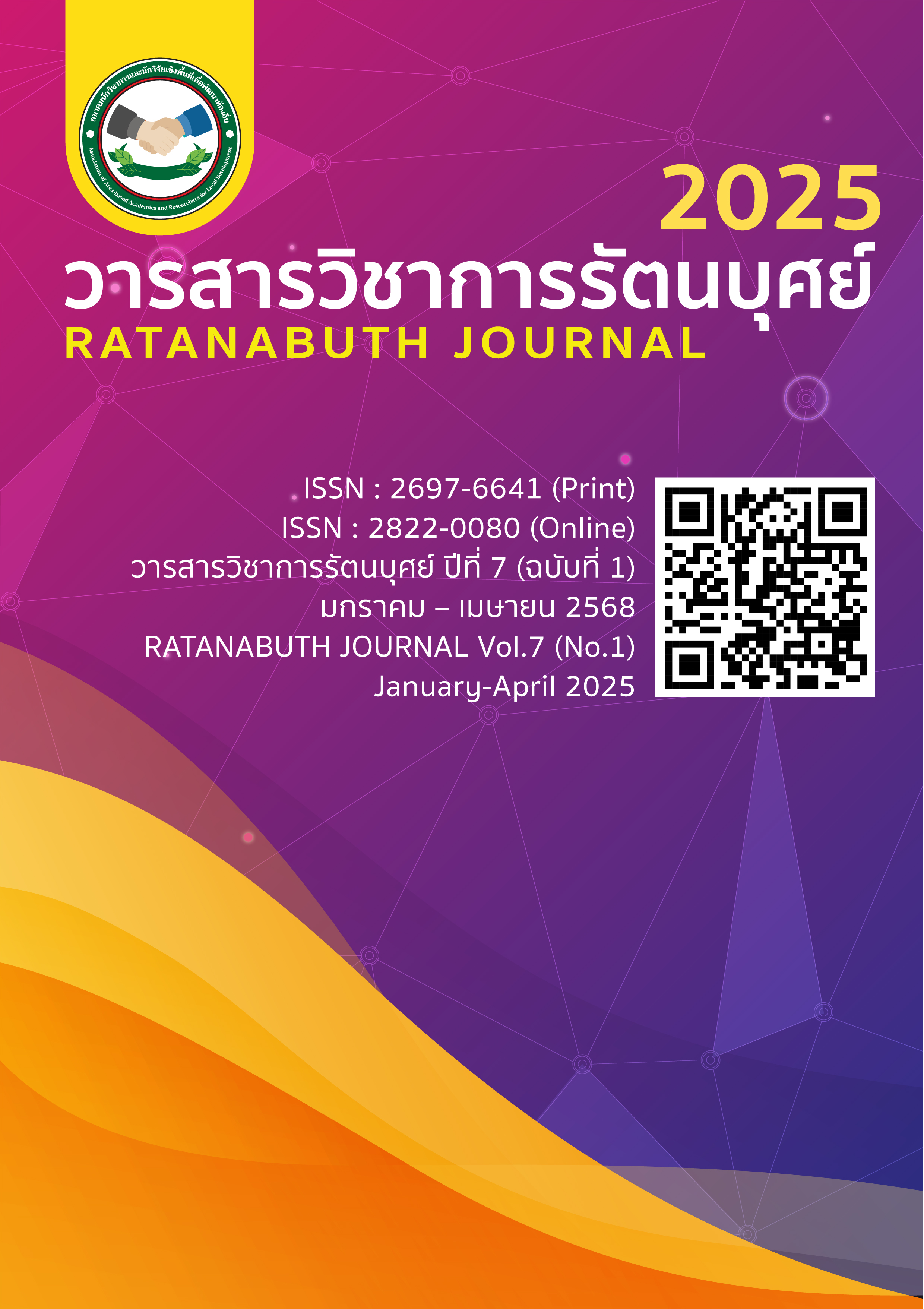A Study of Influencing the Attendance Korean Artist Concerts Among Generation Z A Study of Influencing the Attendance Korean Artist Concerts Among Generation Z
Main Article Content
Abstract
This research had three main goals of studying: 1) to find out what things influence Generation Z's decision to go to Korean pop star concerts, 2) to understand how Generation Z makes the choice to attend these concerts, and 3) to see if there's a connection between these influencing factors and their concert attendance decisions. This study used numbers and surveys to collect information (called quantitative research). A sample group of this study is Generation Z concert attendees who were born between 1996-2003 by not specified exact number. The researcher selected convenience sampling to gain interviewees in the sample group. The tools used were: 1) a questionnaire about the marketing strategies (the 7Ps) aimed at Generation Z, and 2) a questionnaire about how Generation Z decides whether or not to go to a Korean artist's concert. The data Were analyzed using descriptive statistics - percentage, mean, standard deviation - and multiple regression analysis.
The findings revealed that: 1) Generation Z felt that the marketing mix strategies (7Ps) were quite strong in influencing their concert attendance (=4.14, S.D. =0.75). 2) The decision about going to Korean concerts was also quite strong (=4.02, S.D. =0.95). 3) The more complex analysis showed that the type of product (the concert itself), where and how it's available (distribution), and the people involved (like staff) all had a significant impact on whether Generation Z attended Korean pop concerts (at a statistical level of .05).
Article Details

This work is licensed under a Creative Commons Attribution-NonCommercial-NoDerivatives 4.0 International License.
References
ชาคริต รถทอง. (2561). ปัจจัยสำคัญที่มีผลต่อการเข้าชมงานเทศกาลดนตรี EMD.สารนิพนธ์ปริญญามหาบัณฑิต วิทยาลัยการจัดการ.กรุงเทพฯ: มหาวิทยาลัยมหิดล.
ชลนิกา รุ่งเรืองศรี, & จารุณี มุมบ้านเช่า. (2562). กระแสการชื่นชอบศิลปินเคป๊อป (K-pop) เกาหลีในประเทศไทย. ใน การประชุมวิชาการนำเสนอผลงานวิจัยระดับชาติของนักศึกษาด้านมนุษยศาสตร์และสังคมศาสตร์ ครั้งที่ 2. มหาวิทยาลัยราชภัฏสวนสุนันทา.
ชุติมา ชุณหกาญจน์.(2550). พฤติกรรมการเลียนแบบวัฒนธรรมของวัยรุ่นไทยจากสื่อบันเทิงเกาหลี.วิทยานิพนธ์ปริญญามหาบัณฑิต คณะนิเทศศาสตร์. กรุงเทพฯ: จุฬาลงกรณ์มหาวิทยาลัย.
ชูชัย สมิทธิไกร. (2562). พฤติกรรมผู้บริโภค (พิมพ์ครั้งที่ 7). กรุงเทพมหานคร: สำนักพิมพ์จุฬาลงกรณ์มหาวิทยาลัย.
ณัฐนิชา ดนัยดุษฎีกุล. (2564). การศึกษารูปแบบความชอบของแฟนคลับชาวไทยที่มีต่อศิลปินไอดอลไทยและเกาหลี. วิทยาศาสตรมหาบัณฑิต คณะพาณิชยศาสตร์และการบัญชี.กรุงเทพฯ: มหาวิทยาลัยธรรมศาสตร์.
ณิชชา ยงกิจเจริญ. (2559). การเปิดรับข่าวสาร ทัศนคติ และแนวโน้มพฤติกรรมที่มีต่อศิลปินวง EXO ของกลุ่มแฟนคลับ EXO-L.การค้นคว้าอิสระปริญญามหาบัณฑิต.กรุงเทพฯ: มหาวิทยาลัยธรรมศาสตร์.
ทัชระ ล่องประเสริฐ. (2561). Call me oppa. กรุงเทพมหานคร: บันลือบุ๊คส์.
ปุณิกา ปิยะพานุกาญจน์. (2564). ปัจจัยที่มีผลต่อการตัดสินใจในการชมคอนเสิร์ตเสมือนจริง.ปริญญานิพนธ์ปริญญามหาบัณฑิต.กรุงเทพฯ: มหาวิทยาลัยกรุงเทพ.
พรทิพย์ พิมลสินธ์. (2540). ภาพพจน์นั้นสำคัญยิ่ง: การประชาสัมพันธ์กับภาพพจน์ (พิมพ์ครั้งที่ 4). กรุงเทพมหานคร: ประกายพรึก.
มัชฌิมา เฮงสวัสดิ์. (2564). ปัจจัยที่มีอิทธิพลต่อการซื้อเครื่องสำอางเกาหลีของผู้บริโภคที่มีความชื่นชอบศิลปินเกาหลี.สารนิพนธ์ปริญญามหาบัณฑิต วิทยาลัยการจัดการ.กรุงเทพฯ: มหาวิทยาลัยมหิดล.
มนสินี พัฒนสุวรรณ. (2560). ปัจจัยที่มีอิทธิพลต่อการเข้าใช้บริการสถานีบริการน้ำมันเอสโซ่ของประชากรในจังหวัดนนทบุรี. วารสารวิทยาลัยบัณฑิตศึกษาการจัดการ มหาวิทยาลัยขอนแก่น, 10(1), 96–120.
ยงยุทธ ฟูพงศ์ศิริพันธ์. (2546). การจัดการตลาด. กรุงเทพมหานคร: เพียร์สัน เอ็ดดูเคชั่น อินโดไชน่า.
วุฒิ สุขเจริญ. (2559). พฤติกรรมผู้บริโภค. กรุงเทพมหานคร: จี.พี. ไซเบอร์พริ้น.
ศรัณย์ สิงห์ทน. (2552). การเรียนรู้ทางสังคมของวัยรุ่นไทยจากวัฒนธรรมเพลงสมัยใหม่ของประเทศเกาหลีใต้.วิทยานิพนธ์ปรัชญาดุษฎีบัณฑิต.กรุงเทพฯ: จุฬาลงกรณ์มหาวิทยาลัย.
สุพศิน รัตนภราดร. (2562). พฤติกรรมการเข้าชมคอนเสิร์ตของเจเนอเรชันวายในประเทศไทย.วิทยาศาสตรมหาบัณฑิต คณะพาณิชยศาสตร์และการบัญชี.กรุงเทพฯ: มหาวิทยาลัยธรรมศาสตร์.
อภัสรา แววสมณะ. (2560). อิทธิพลของ Electronic Dance Music ที่มีผลต่อ Generation-Y.นิเทศศาสตรมหาบัณฑิต.กรุงเทพฯ: มหาวิทยาลัยกรุงเทพ.
เอกณัฐ อยู่คงศักดิ์. (2567). พฤติกรรมการตัดสินใจซื้อและทัศนคติของผู้บริโภคที่มีต่อบัตรคอนเสิร์ตในประเทศไทย.ปริญญานิพนธ์ปริญญามหาบัณฑิต.กรุงเทพฯ: มหาวิทยาลัยมหิดล.
Best, J. W. (1977). Research in education (3rd ed.). Englewood Cliffs, NJ: Prentice Hall.
Cochran, W. G. (1953). Sampling techniques. New York: John Wiley & Sons.
Grail Research. (2011). Consumers of tomorrow: Insights and observations about Generation Z. U.S.A.: Grail Research.
Kotler, P. (2002). Marketing management (11th ed.). Upper Saddle River, NJ: Pearson Prentice Hall.
Lovelock, C., & Wirtz, J. (2011). Services marketing: People, technology, strategy (7th ed.). New Jersey: Pearson.
McQueen, M. (2011). Ready or not... here comes Gen Z. Retrieved from http://michaelmcqueen.net/phocadownload/parentsteachers/Ready
Merrill, J. C., & Lowenstein, R. L. (1979). Media, messages, and men: New perspectives in communication. New York: Longman.


